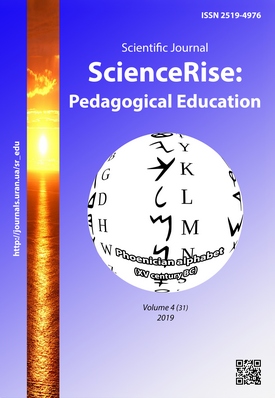Criteria and formation levels of professional competences of specialists of the nature protection branch in ecological monitoring
DOI:
https://doi.org/10.15587/2519-4984.2019.174106Keywords:
ecological monitoring, postgraduate education, criteria, levels, professional competences, professional developmentAbstract
During the study there were elaborated criteria and estimation levels of the multi-step system of training specialists of the nature protection branch for ecological monitoring: for future specialists and professionals by the formation level of professional competences in ecological monitoring; for specialists of the nature protection branch by the level of readiness to the professional activity. There was constructed a criteria-level scale for estimating future competences formation of future specialists that includes motivational, theoretical-methodological and analytical-practical criteria. The estimation is realized by reproductive, sufficient and high levels. For future professionals in ecological monitoring, the criteria-level scale for estimating professional competence formation includes motivation-value, activity-practical, scientific-research criteria and interpreting, constructive, research levels. For the professional development of specialists of the nature protection branch in the system of postgraduate education, a criteria-level scale was developed for estimating the level of readiness to the professional activity, including the following criteria: motivational-axiological for estimating formation motives of the professional nature protective activity; competence for estimating professionalism; professional attitude for estimating a personal attitude to the professional activity, especially independence in making decisions, in using different approaches to solving complicated ecological situations, in elaborating and planning projects for improving the environment quality. Corresponding to peculiarities of the professional development, there were determined readiness levels, namely basic, integrative-projective, creative. There were elaborated and substantiated criteria, parameters and levels that provide the estimation of the multi-level training system of specialists of the nature protection branch for ecological monitoring through the formation of professional competences and readiness to the professional activity
References
- Borodiienko, O. (2017). Kryterii, pokaznyky, rivni sformovanosti profesiinoi kompetentnosti kerivnykiv strukturnykh pidrozdiliv pidpryiemstv sfery zviazku. Molod i rynok, 7 (150), 109–115.
- Semenova, A. V. (Ed.) (2006). Slovnyk-dovidnyk z profesiinoi pedahohiky. Odessa: Palmira, 364.
- Huba, A. V. (2016). Stratehiia formuvannia profesiinoi kompetentnosti menedzhera turystychnoi industrii. Kharkiv: KhNPU, 260.
- Vizniuk, V. V. (2016). Kryterii ta rivni sformovanosti profesiinoi nadiinosti maibutnikh kerivnykiv navchalnykh zakladiv v umovakh mahistratury. Naukovyi chasopys NPU imeni M. P. Dahomanova. Seriia 5. Pedahohichni nauky: realii ta perspektyvy, 55, 52–57.
- Onyshchuk, S. O. (2018). Kryterii, pokaznyky ta rivni sformovanosti zdoroviazberezhuvalnoi kompetentnosti v maibutnikh fakhivtsiv. Naukovyi chasopys NPU imeni M. P. Drahomanova, 3K (97), 387–390.
- Biletska, H. A. (2014). Criteria, Indicators, and Levels of Natural Science Competence of Prospective Ecologists. Education and Pedagogical Sciences, (2 (163)), 19–24. http://doi.org/10.12958/eps.2(163).biletska_h_a
- Huzii, N. V. (2015). Kreatyvno-aksiolohichna spriamovanist dydaskalohichnoho osvitnoho prostoru stanovlennia pedahohichnoho profesionalizmu naukovo-pedahohichnykh kadriv. Teoriia i praktyka pidhotovky naukovo-pedahohichnykh kadriv v Ukraini. Kyiv: SPD-FO Rudyk V. A., 223–233.
- Vincent, S., Focht, W. (2010). Environmental Reviews and Case Studies: In Search of Common Ground: Exploring Identity and Core Competencies for Interdisciplinary Environmental Programs. Environmental Practice, 12 (1), 76–86. doi: http://doi.org/10.1017/s1466046609990433
- Ramsarup, P., Lotz-Sisitka, H. (2017). The nature of learning and work transitioning in boundaryless work: the case of the environmental engineer. Southern African Journal of Environmental Education, 33 (1), 99–116. doi: http://doi.org/10.4314/sajee.v.33i1.8
- Ponomarenko, Y., Yessaliev, A., Kenzhebekovac, R., Moldabekc, K., Larchekovad, L., Dairbekove, S. et. al. (2016). Students’ Environmental Competence Formation as a Pedagogical Problem. International Journal Of Environmental & Science Education, 11 (18), 11735–11750.
Downloads
Published
How to Cite
Issue
Section
License
Copyright (c) 2019 Natalia Bordiug

This work is licensed under a Creative Commons Attribution 4.0 International License.
Our journal abides by the Creative Commons CC BY copyright rights and permissions for open access journals.
Authors, who are published in this journal, agree to the following conditions:
1. The authors reserve the right to authorship of the work and pass the first publication right of this work to the journal under the terms of a Creative Commons CC BY, which allows others to freely distribute the published research with the obligatory reference to the authors of the original work and the first publication of the work in this journal.
2. The authors have the right to conclude separate supplement agreements that relate to non-exclusive work distribution in the form in which it has been published by the journal (for example, to upload the work to the online storage of the journal or publish it as part of a monograph), provided that the reference to the first publication of the work in this journal is included.







